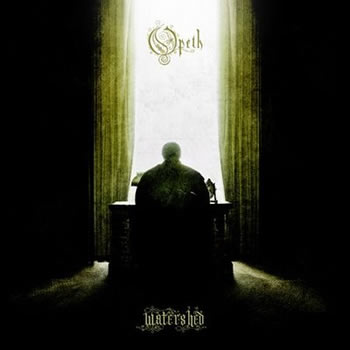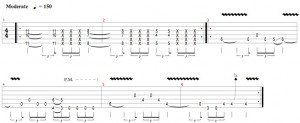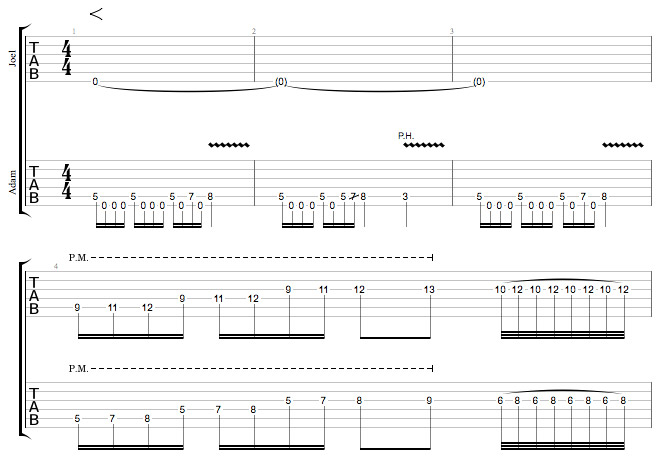 Release Date: June 3, 2008
Release Date: June 3, 2008
With each album Opeth have released since their first album in 1995, they have been perfecting their combination of extreme metal’s brutality and progressive rock’s complex song structures and harmonies. Singer, guitarist, and mastermind Mikael Åkerfeldt’s band first attracted the attention of the broader metal community with 2001’s Blackwater Park, which benefited from the producing expertise of Porcupine Tree’s Steven Wilson – who finally gave Opeth’s rich music the sonic power it deserved. With Wilson’s help, Opeth explored and expanded the mellower side of their sound on 2003’s Damnation, after becoming heavier than ever on parts of 2002’s Deliverance. On 2005’s Ghost Reveries, with the addition of keyboardist Per Wiberg, Opeth incorporated the newly improved extremes of their style into a well-realized whole.
On Watershed, Opeth take the path they traveled on Ghost Reveries and stretch it out in every direction – further integrating keyboardist Per Wiberg, as well as two members who have joined since the last album: guitarist Fredrik Åkesson and drummer Martin Axenrot. Additionally, they incorporate small woodwind and string sections into the music – a decision that mirrors the unorthodox approach to songwriting Opeth take on Watershed, the band’s most diverse and experimental album yet.
‘Coil’ immediately draws you into Opeth’s world with a series of haunting, softly dissonant chords that set the stage for Åkerfeldt’s mournful vocals. Spicing up the main theme of this short opener are some beautiful bass lines courtesy of Martin Mendez, and a striking wind arrangement that brightens the song’s chorus. Answering Åkerfeldt’s verse is a beautiful female voice provided by Axenrot’s girlfriend Nathalie Lorichs – another surprising first for the band, who until now have only featured their former producer Steven Wilson as a guest vocalist.
‘Heir Apparent’ opens like a slow-groove version of ‘Deliverance’ – a staple of Opeth’s live shows and the most mosh-inspiring song the band has ever written. This song features one of the most intricate and fist-pumping riffs Opeth have ever devised, which serves as a backdrop for both the furious drumming of Axenrot as well as a tastefully demented solo from Åkesson. The low E string has never sounded heavier. There are several quiet sections in ‘Heir Apparent,’ but they feel less like a break from the violence and more like the soundtrack to a psychotic nightmare. Just when you think that the song has escalated to its frenzied peak, it gives way to a majestic groove featuring one of Åkerfeldt’s most somber and memorable melodies.
‘Lotus Eater’ begins with a jazzy bit of humming, and becomes more unusual once the metal kicks in. Featuring a dreamlike melody that is violently supported by Axenrot’s blast beats, this recurring riff is not the strangest part of the song. Nor is the jarring clean section that follows, which feels like a brief but disturbing descent into madness. No, the strangest section is what can best be described as creepy progressive funk featuring Wiberg – it’s weird, and it’s grooving, too. ‘Lotus Eater’ covers a lot of new ground in just under nine minutes, though it also features some vintage Opeth grooves and a soaring Åkerfeldt solo. Most importantly, everything in the song fits and flows surprisingly well.
‘Burden’ feels like the soft spot of the album from Wiberg’s delicate first chords, which are soon joined by a soft Åkerfeldt solo that would have been at home in Damnation’s introspective ‘Hope Leaves.’ Just when it seems that Opeth are about to revisit the sad beauty of that album, Åkerfeldt kicks in with his strongest clean vocals to date, and Opeth’s first rock power ballad begins in earnest. The song plays out the way you’d expect an Opeth power ballad to, as strange as that feels to say – the verse winds through a melancholy chord progression, and the chorus is punctuated by dramatic Åkesson mini-solos. Breaking up the familiar form are some stellar solo sections: first a positively rocking organ solo from Wiberg, and then an exciting trade-off between Åkerfeldt and Åkesson that ends in a dual-guitar harmony that’s vintage Åkerfeldt. The ending, though, is where ‘Burden’ really feels like a part of Watershed. It starts out nicely enough with some pretty acoustic guitar work, but quickly becomes a showcase for some of the band’s most unusual alternate tunings.
‘Porcelain Heart’ works best as a showcase for Axenrot’s diverse drumming. His playing on the opening theme moves through several distinct stages, and does a great job of building tension. The galloping riff that comes in midway through the song develops nicely with harmonized vocals and great drumming from Axenrot, but it feels out of place with the opening section and the eerie acoustic verses. Both times that the riff appears in the song, the transitions around it feel unnatural – which is surprising coming from a band that normally does such a great job of blending drastically different elements into a single song. It’s particularly unfortunate that the parts don’t mesh, as most of them are terrific on their own.
‘Hessian Peel’ brings back the excellent dynamic flow that Opeth fans have come to expect. In less than twelve minutes, the song moves smoothly between upbeat sections of sorrowful acoustic guitars and dissonant onslaughts of screaming, and features a grooving acoustic riff that’s accompanied by clever drumming and a great string arrangement.The final moments of the track are some of the darkest and most unsettling yet on an album full of surprises.
‘Hex Omega’ steals the show by concisely combining the experimental spirit of Watershed with Opeth’s riff-oriented songwriting style. As a result, the song is filled with haunting vocal melodies and fantastic riffs, both delivered with an epic sense of atmosphere. The trudging riff that closes the song is a dramatic finish for the most progressive album Opeth have recorded yet.
As always, Åkerfeldt’s vision ensures that the music flows together to form a coherent album. As a whole, Watershed leaves you feeling satisfied, but the individual songs don’t always feel as connected as they have on past efforts. The album’s shorter and less frequently repeated song sections are partly responsible for making the tracks harder to grab onto, and it makes the album less focused on groove than past efforts have been. The moments that do linger after the first listen are infectious, particularly those in ‘Heir Apparent, ‘Hex Omega,’ and the sweeping ‘Burden,’ and listeners who invest time in Watershed will be rewarded with a musically rich album. It’s great to see a band with a winning formula continue to mix it up, and Opeth have never sounded fresher or more daring than they do here. In fact, on this album even more than on Ghost Reveries, the band lean more towards progressive rock than they do towards metal, which makes for some impressive song structures and many bizarre moments that test the listener’s grasp on sanity.
All of this experimentation makes Watershed an exciting album for Opeth fans – as well as prog fans with a stomach for heaviness, and metal fans with a taste for the unusual. Opeth’s track record of persistently pushing boundaries suggests that they haven’t made their ultimate album yet, which means that their listeners have a lot to look forward to. Underneath the new flavors, the beauty and brutality that have always driven Opeth’s sound live on in Watershed.
Overall: 4.5/5

















